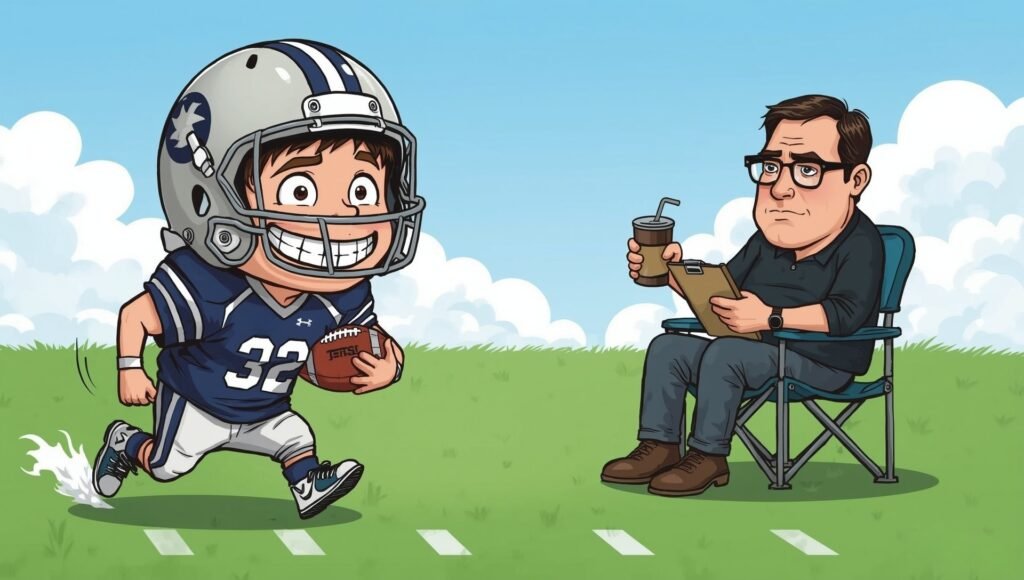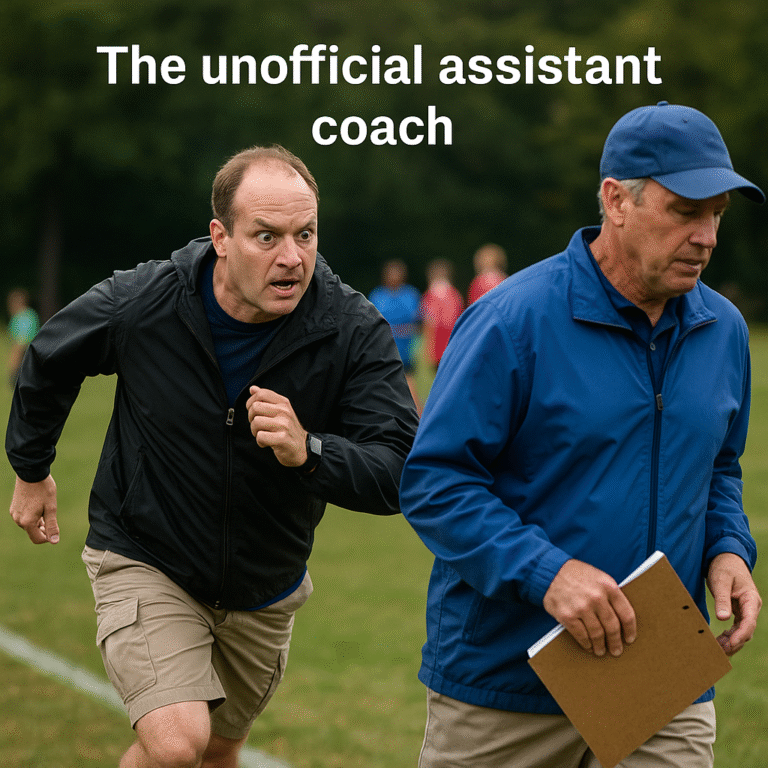You think the biggest problem in youth sports is refs? Wrong.
You think it’s the endless weekend road trips? Wrong again.
You think it’s the weather, the costs, or the snack schedule? Cute guess, but nope.
The real threat to youth sports isn’t on the field at all.
It’s standing next to you on the sideline, sipping an iced coffee, wearing the same team hoodie… and loudly trashing a 12-year-old on their own team.
Yep. Toxic sideline parents. The silent killers of fun, team chemistry, and everyone’s sanity. And if you’ve ever had to sit next to one, you already know: no pair of noise-canceling headphones
When the Sideline Turns Ugly

Picture this. The game is tight. The kids are battling. The coach is pacing like they’re about to be interviewed on ESPN. Parents are holding their breath. And then it happens…
“Why does the coach keep putting him in? He can’t even catch the ball.”
And just like that, the mood shifts. The energy drops. The kids hear it. The coach hears it. You hear it. And suddenly, instead of cheering for your team, you’re fantasizing about switching your kid to bowling.
The kicker? This isn’t the other team’s parent. It’s one of yours. Same hoodie, same blanket, same Dunkin iced coffee. They’re supposed to be on the same side, but instead they’ve decided today’s role is sideline assassin. Congratulations, we’re officially living in Real Housewives of the Youth Sports Sideline.
The Harsh Truth Parents Don’t Want to Hear

These are kids. Literal kids. They’re still figuring out how to run without falling over. Their brains are buffering puberty like it’s a slow Wi-Fi connection. One week they’re scoring hat tricks, the next week they forget which net belongs to them. That’s what youth sports are about. That’s normal.
But toxic sideline parents? They don’t care about normal. They treat every mistake like it’s a crime against humanity. They sip from their Stanley tumblers and give a live play-by-play analysis, as if they’re being paid by ESPN to break down the game.
Spoiler: nobody is impressed. Least of all the kids, who now associate sports with adult drama instead of fun.
The Fallout Nobody Sees Coming
Here’s the damage. Your kid hears you. Their teammates hear you. The whole team hears you. And instead of building trust, you’ve created tension.
Jimmy doesn’t want to pass to Billy because Billy’s mom has been trashing him all season. Parents stop talking about who brought snacks and start whispering like high school cliques in the cafeteria. The coach? They notice. Oh, they notice. Every coach knows exactly who the toxic sideline parents are.
And here’s the plot twist: being that parent doesn’t help your kid’s playing time. It does the opposite. Coaches reward kids who bring unity. They bench the ones whose parents bring chaos.
If you’re unlucky enough to be parked next to one of these parents? Bring noise canceling headphones
Meet the Sideline Hall of Shame

Every team has its characters. You know them. You’ve sat next to them.
The Fake Whisperer. They think muttering insults under their breath is subtle, but they’re about as quiet as an airhorn.
The Economist. Loves reminding everyone how much the season costs. “For this price, we should be undefeated!” Sure, Karen. I’m sure your Venmo fee really rattles the other team.
The Scout From Nowhere. The dad who claims he “knows talent” because he once went to a minor league game in 1998. His kid misses a wide-open shot, but apparently he’s the authority on everyone else’s ability.
The Facebook Reporter. Posts “unbiased updates” in the team group chat that somehow always shade another kid. Oh, and their live play-by-play commentary always “accidentally” forgets to mention when their own kid screws up.
These parents are comedy gold if you’re just watching them. The problem is, their jokes land on kids who didn’t ask to be the punchline.
The Greatest Hits of Toxic Parents

We’ve all heard the lines, and we can recite them like bad karaoke:
“My kid would’ve scored if the coach actually knew how to coach.”
“Do we even practice defense?”
“The ref clearly hates us.”
“Jimmy’s dad must have bribed the coach.”
And the all-time classic: “We’re not coming back next year.” (Narrator voice: they were back next year. In the front row. With a brand-new team hoodie.)
It’s like a broken playlist that never ends. And the worst part? It drowns out what youth sports are supposed to sound like: cheering, encouragement, and the occasional “Nice hustle, kid!”
Why It Actually Matters
It’s easy to laugh at these people, but here’s the thing: youth sports are supposed to teach life lessons. How to lose, how to win, how to get knocked down and try again. They’re supposed to give kids confidence, resilience, and memories they’ll carry forever.
When toxic sideline parents turn games into roast sessions, kids learn something else entirely. They learn that mistakes should be punished instead of fixed. They learn that teammates are rivals, not partners. And they learn that adults can sometimes be the worst role models in the room.
And here’s the part parents forget: kids don’t remember the score nearly as much as they remember the feeling. Was the sideline supportive? Or was it hostile? Did teammates’ parents cheer them on, or pray they’d sit down? That’s the stuff that sticks.
The Mic Drop

Criticizing kids on your own team doesn’t make you insightful. It doesn’t make you the smartest person on the field.
It makes you the reason everyone secretly hopes the next game gets rained out.
So the next time you feel like critiquing a twelve-year-old like they’re signing a million-dollar contract, do everyone a favor: shove a granola bar in your mouth, clap for the team, and remember, you’re the adult here.
Because the truth is, your kid might forget the score, but they’ll never forget the vibe. And if you’re the one poisoning it? Congratulations. You’re not helping youth sports. You’re ruining them.
👉 Drop your most ridiculous toxic sideline parent story in the comments. Extra credit if it involves someone acting like a Division I scout while double-fisting sunflower seeds.
If you survived this rant, you’ll love my other one about the rarest event in youth sports history, a game where parents actually behaved. Read it here:
FAQ: Toxic Sideline Parents
What exactly are toxic sideline parents?
They’re the moms and dads who spend more energy criticizing kids, coaches, and refs than actually cheering for the team. They treat a Saturday morning youth football game like it’s the Super Bowl, complete with hot takes, gossip, and “expert analysis.” Basically, they’re the sideline version of friendly fire
Why are toxic sideline parents such a big deal?
Because kids hear everything. When parents trash other kids on the same team, it kills team chemistry, puts unnecessary pressure on everyone, and turns what should be fun into stress. Coaches notice too, and trust me, no coach is rewarding that behavior with extra playing time.
How do I deal with toxic parents on the sideline?
You’ve got options:
– Move your chair and protect your peace
– Pop in some noise canceling headphones
– Redirect the conversation (“Hey, did you see the snacks today?”)
– Or, my personal favorite, cheer louder for every single kid, just to drown them out.
Do toxic sideline parents actually affect kids’ development?
Absolutely. Sports are supposed to teach resilience, teamwork, and fun. When kids hear adults ripping each other apart, they don’t learn resilience, they learn to play scared. And nobody signs up for youth sports just to be terrified of their teammates’ parents.
Are all competitive parents toxic?
Not at all. It’s normal to want your kid to succeed. But there’s a line between being supportive and being toxic. Cheering loudly? Fine. Living vicariously through your kid’s missed shot like it’s a personal attack on your soul? That’s toxic territory.
How can parents avoid becoming toxic themselves?
Easy. Cheer for all the kids, not just yours. Let coaches coach. Save the hot takes for the ride home (or better yet, never). And remember: your kid won’t remember the score, but they’ll definitely remember how you acted on the sideline.



